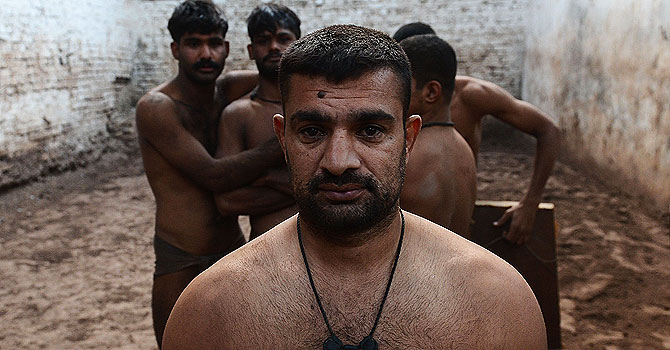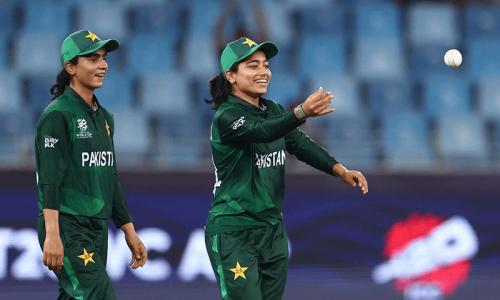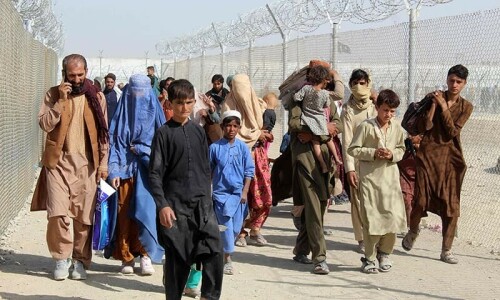
LAHORE: For decades, their practice ring honed the talent of Pakistan's most famous wrestling family. Today, it is their graveyard, a fitting symbol of the decline of the sport traditionally known as 'kushti'.
Government neglect and poverty has helped consign the glorious feats of Pakistani wrestlers, locally called 'pehlwan', to fast-fading memory. Only a handful carry the torch for the next generation and few command the thousands of spectators of days gone by.
From 1954 to 1970, Pakistan won 18 wrestling gold medals in the Commonwealth Games, five at the Asian Games and a Bronze in the 1960 Olympics.
There was a gold at the Asian Games in 1986 and two in the 2010 Commonwealth Games, but apart from that, international victories have all but dried up. Rings that once thronged with thousands of spectators are now silent.
“I can't speak about wrestling, it hurts me,” said Abid Aslam Bholu, whose late brother Jhara was the last of the Bholu family to win titles. The legacy ended there, with Abid instead choosing a career in business as wrestling faded.
“We've lost all the glory and it's painful to recall the golden days.”
The family were wrestlers since 1850. The golden generation – brothers Bholu, Azam, Aslam, Akram and Goga – practiced opposite the independence monument in the eastern city of Lahore and behind the shrine of a famous sufi saint.
On the worldwide exhibition circuit, they were champions.
Bholu challenged American wrestler Lou Thesz and India's Dara Singh – both world champions – in 1953, although neither accepted.
In 1967, he offered 5,000 British pounds to anyone in the world who could beat him and that same year won the World Heavyweight Title fight against Anglo-French heavyweight champion Henry Perry in London.
Aslam and Azam enjoyed victories against champions around the world in the 1950s while Akram was nicknamed Double Tiger in 1953 when he beat Ugandan champion Idi Amin.
Jhara, who died in 1991 at 31, was the last big name in the family.
Abid has a construction business, a money exchange office, a modern residential development on the edge of the Lahore-Islamabad motorway and an import-export firm and earns more than he ever could from wrestling.
“There is no respect for the wrestlers now, there is no more money in the game, so why should one wrestle,” he told AFP.
“Staying at number one is difficult. And when you are number one and nobody respects you, the government doesn't care about you and your family doesn't have enough resources, it's better to do business and earn money,” he said.
“No future, no money”
For centuries, the rulers of Indian states kept wrestlers to fight rival teams, feeding and paying them well because their victories brought glory to the state.
But after partition from India in 1947, authorities in the new state of Pakistan ignored its wrestlers.
Those left in the sport say that of the 300 akharas, or mud wrestling courts in 1947, barely 30 still operate. The number of wrestlers has fallen from around 7,000 to 300.
Few youngsters are interested and practice courts in central and southern provinces Punjab and Sindh, where most are found, lie deserted.
However, 19-year-old Shehwar Tahir is an exception.
“I have a few friends who practice with me but young people don't want to become wrestlers,” Tahir told AFP, oiling his body for a workout.
“They say 'why play this game when it has no future, no money' and especially when they can't afford daily meals to gain power and maintain their weight.”
Tahir wakes up at 4 am to do sets of push ups and say morning prayers before going back to bed.
He rises again in the afternoon and goes to the court to do more push ups.
Tahir digs up a 30 square foot mud court with a large hoe, then ties a wooden bar to his neck with a strong rope and pulls the length and width of the court with another wrestler sitting on the bar, to press and level the clay.
To do all these exercises and strengthen his body, he says he has to eat bread, chicken, pulses, fruits and two kilos of almonds everyday to maintain his body weight of 90 kilos (198 pounds). He drops to 84 kilos for competitions.
But Tahir's coach, Amir Butt, says many people can't afford it in a country of huge unemployment.
“Being a wrestler has become very expensive. We are unable to produce many quality wrestlers because it costs at least 1,500 rupees ($16) a day for food and not everybody can afford it.”
The Pakistan Wrestling Federation says the Pakistan Sports Board (PSB) does not have enough money, and that providing grants to private clubs and courts was a complicated process.
Calls for the sponsorship of private akharas are getting louder, said Chaudhary Muhammad Asghar, secretary of the wrestling federation.
He added that a domestic competition with attractive prize money was being devised to try and bring interest back to the sport and return Pakistan to the international arena.
"There is a realisation that these courts should be supported in some way," he said.















































